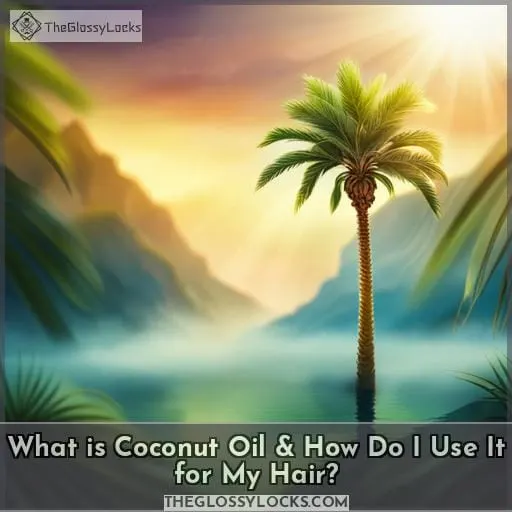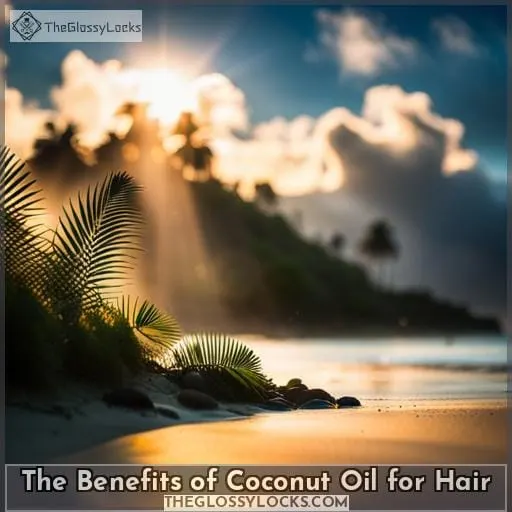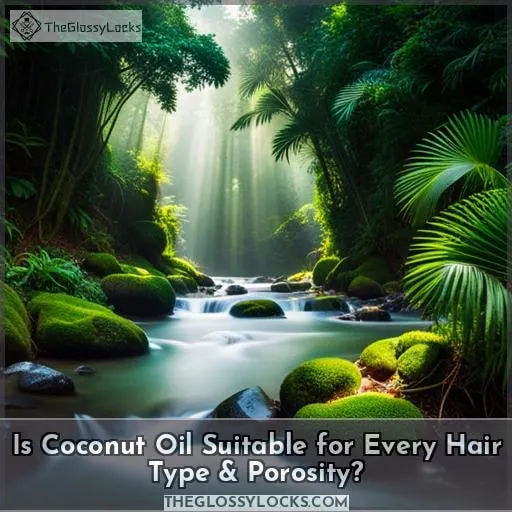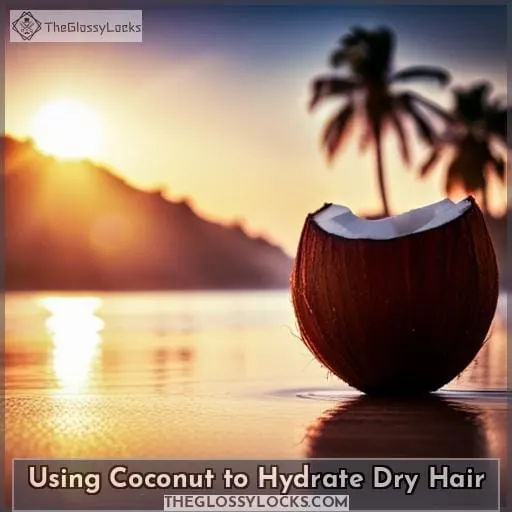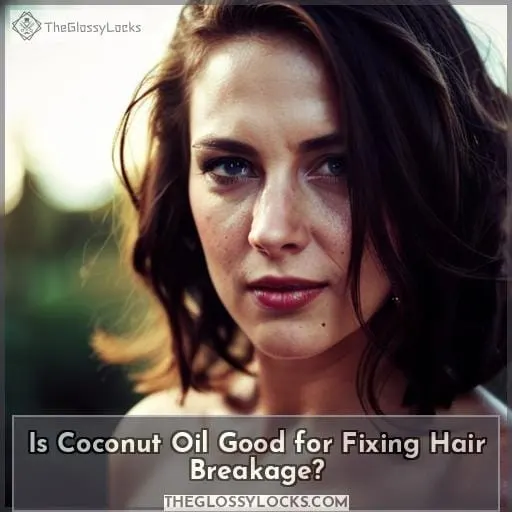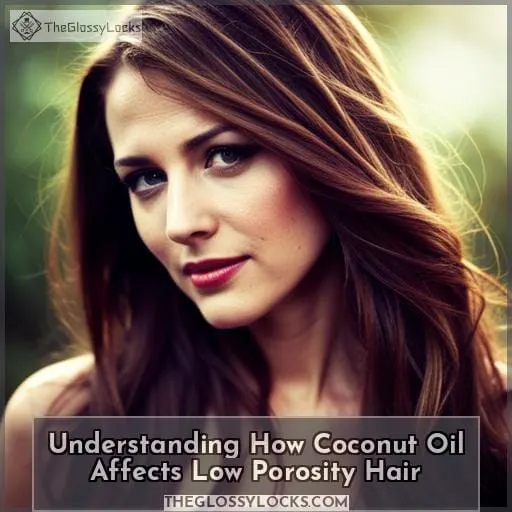This site is supported by our readers. We may earn a commission, at no cost to you, if you purchase through links.
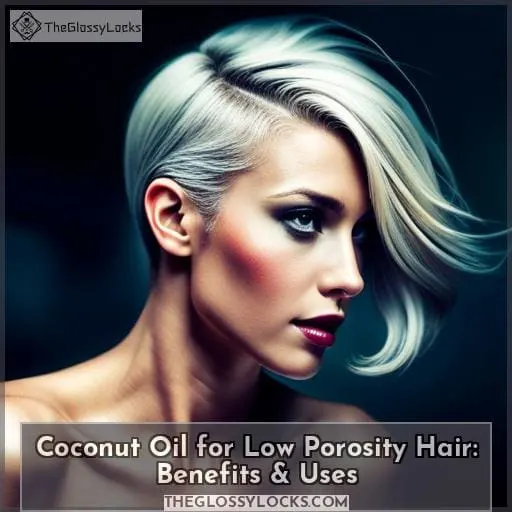
Table Of Contents
- Key Takeaways
- What is Coconut Oil & How Do I Use It for My Hair?
- The Benefits of Coconut Oil for Hair
- Is Coconut Oil Suitable for Every Hair Type & Porosity?
- Can You Apply Coconut Oil to Curly Hair?
- Using Coconut to Hydrate Dry Hair
- Is Coconut Oil Good for Fixing Hair Breakage?
- Understanding How Coconut Oil Affects Low Porosity Hair
- The Exception to the Rule
- Conclusion
Key Takeaways
- Fractionated coconut oil is better for low porosity hair.
- Understanding porosity is essential when using coconut oil.
- The type of coconut oil matters for effectiveness.
- Alternatives like avocado and jojoba oils can work well.
What is Coconut Oil & How Do I Use It for My Hair?
You can use coconut oil to protect and nourish your hair, adding shine while helping you achieve optimal results with manageable styling. Coconut oil is derived from the meat of coconuts and can be either solid or liquid.
It helps seal moisture in the hair shaft as well as strengthen existing proteins for a healthier look.
A great way to incorporate this versatile ingredient into your haircare routine is through pre-shampoo treatments.
Understanding porosity levels plays an important role when using coconut oil on low porosity locks. Remember that due to its close cuticle structure, it might not absorb oils easily. This can lead to greasiness and dryness if not used correctly. Fractionated versions are generally better suited for this type of texture.
They help keep the right amount of hydration without feeling heavy or sticky afterwards.
Knowing how fragile low porosity strands can be means preventing breakage by avoiding extreme heat exposure during styling routines. Along with proper moisturizing techniques every so often, this should become part of our daily habits instead.
For those suffering from thinning edges specifically, do give Curlsmith’s products a try.
The Benefits of Coconut Oil for Hair
Coconut oil is a versatile ingredient that can be used to penetrate, moisturize, and nourish low porosity hair while also helping to prevent product buildup. Used correctly in small amounts, it has the potential to make your hair appear fuller and longer while maintaining healthy, beautiful locks.
Penetrates low porosity hair
With its unique ability to penetrate even the most tightly-wound strands of hair, coconut oil is like an unlocking key that can reveal a whole world of hydrated, healthy hair. It enhances penetration by softening and moisturizing the cuticle layers while strengthening existing proteins within the shaft.
Despite misconceptions about oil effectiveness on different porosities, coconut oil works to make up for any deficiencies in other oils or conditioners when used correctly. Its sealing properties lock in moisture, giving you more control over your desired style without weighing down those precious curls.
For optimal results and improved manageability with your specific type of tresses, look no further than using coconut oil specifically designed for haircare!
Moisturizes and nourishes
Coconut oil helps bring life back into your tresses, deeply moisturizing and nourishing them for a healthy shine. It is rich in fatty acids that strengthen hair while locking in moisture, making it an ideal choice for hydrating dry hair.
The coconut oil seals the cuticle layer of each strand of hair, improving softness and retaining hydration over time. This allows you to enjoy added benefits like improved manageability, increased elasticity, and additional protection against breakage from styling or environmental factors such as sun exposure or pollution.
Coconut oil also offers natural nutrition by providing essential vitamins, minerals, and proteins needed for healthier-looking locks without weighing down your style! With regular use, this versatile ingredient will give you softer, smoother strands with enhanced bounce that’s full of luster – perfect for any type of porosity!
Prevents product buildup
Regularly applying coconut oil to your hair can help reduce the amount of product buildup, leading to healthier and more manageable locks. Coconut oil is a versatile ingredient for hair care that seals moisture in hair while strengthening existing proteins.
Its benefits include preventing greasiness and product residue on low porosity hair as it penetrates easily into the shafts.
Is Coconut Oil Suitable for Every Hair Type & Porosity?
Not all oils are created equal – find out if coconut oil is the right choice for your hair type and porosity! Coconut oil has been a popular ingredient in haircare products for many years due to its versatility and ability to seal in moisture.
However, it’s important to note that this particular oil may not be suitable for everyone, especially those with low porosity hair.
Low porosity hair has closely spaced cuticles, which can make it difficult for oils like coconut oil to penetrate the shaft adequately. As a result, excessive use of this product on low porous strands could lead to greasiness or dryness instead of nourishment.
Therefore, people with such locks should consider alternatives that offer more slip and hydration without compromising the condition of their tresses.
Here are some things you should keep in mind when choosing an appropriate alternative:
- Porosity misconceptions – Make sure you understand how each product will interact with your unique curl pattern before making any purchases; some products advertised as low-porous won’t necessarily work best on certain textures/types so do your research first!
- Best Hair Oils – Experimenting with different lightweight options like avocado or jojoba is key; they’re less likely than heavier formulas (like olive) to cause buildup while still providing adequate hydration levels over time.
- Coconut Oil Drawbacks – Although beneficial overall – especially when used correctly – it may not always be ideal depending on individual needs; remember that too much can leave behind residue which eventually leads down a path no one wants!
Ultimately, there’s no one size fits all solution but by doing proper research into what works best according to specific needs, we can maximize our results from whichever route taken towards beautiful healthy curls/locks.
Can You Apply Coconut Oil to Curly Hair?
Applying coconut oil to curly hair can help maintain healthy, beautiful locks while adding shine and manageability. Coconut oil is a versatile ingredient that derives from coconut meat, which helps seal in moisture and strengthen existing proteins within the hair.
It’s suitable for all types of curls as long as it’s used correctly – in small amounts with other lightweight products – so you don’t weigh down your tresses or cause product buildup.
The benefits of using coconut oil on curly hair are numerous. It enhances overall health, moisturizes strands, reduces frizziness, and repairs breakage due to heat styling tools or chemical treatments such as coloring and perming.
Plus, if you choose a quality product specifically designed for use on curls (like Curlsmith’s range), it’ll have additional nourishing ingredients like jojoba oils too! This will further benefit your tresses by keeping them soft, hydrated, and bouncy without any greasiness or itchiness caused by excessive application—something which may be experienced when dealing with low porosity hairs especially.
Benefits:
- Moisturizes
- Strengthens Proteins
- Enhances Overall Health
- Reduces Frizz
- Repairs Breakage
Precautions:
- Use Small Amounts
- Avoid Excessive Use
- Excess Greasiness/Itchiness
- Low Porosity Hair
Products:
- Curlsmith Range
- Jojoba Oils
- Nourishing Ingredients
By co-washing with coconut-infused products followed up by applying small amounts of pure unrefined virgin cold-pressed organic raw natural liquid form fractionated coconut oils during damp conditioning sessions once every week, this process should keep those delicate coils looking lusciously shiny while aiding repair from damage induced through everyday wear & tear activities including brushing & combing throughout the day.
Additionally, incorporating this amazing elixir into one’s daily routine would help make those manes appear fuller & longer over time, plus also protect against future harmfulness linked directly to environmental factors like dust particles, pollutants, etcetera.
Using Coconut to Hydrate Dry Hair
Hydrating dry hair with coconut oil can help lock in moisture, improve manageability, and give it a healthy shine. Coconut oil is a versatile ingredient for hair care and is derived from coconut meat. It seals moisture into the hair shaft while also strengthening existing proteins to add shine when used as part of your styling routine.
Here are some tips on using coconut oil for optimal hydration:
- Incorporate other lightweight products like leave-in conditioners or serums to increase its moisturizing power without weighing down the hair.
- Pre-shampoo treatments with small amounts of natural oils such as fractionated coconut oil can be beneficial by penetrating deeply into each strand.
- If you have curly or low porosity hair, avoid excessive use as this could lead to greasiness, itchiness, and dryness.
- Co-washing with sulfate-free shampoos that contain infused ingredients like aloe vera or shea butter will help retain moisture levels in your strands.
By utilizing these techniques along with regular trims, you’ll be able to achieve optimal results while maintaining healthy, beautiful locks!
Is Coconut Oil Good for Fixing Hair Breakage?
Discover how coconut oil can help you mend your hair breakage and restore its natural luster. Coconut oil is one of the most versatile ingredients for hair care, derived from the meat of coconuts. It has the ability to penetrate deeply into each strand, sealing in moisture and strengthening existing proteins within the hair shafts.
Coconut oil also adds shine to strands while helping with styling routines as well as preventing product buildup.
When it comes to fixing broken or fragile hairs, coconut oil may not always be ideal due to low porosity concerns. This means that the cuticles are closely spaced together, making it difficult for oils like coconut oil to access them easily without causing itchiness or greasiness.
This could lead to further damage such as dryness over time instead of the desired repairment outcomes. Nonetheless, fractionated versions (liquid) are a better choice since they contain smaller molecules, allowing easier penetration through more closed-off cuticles found on this type of hair than other heavier alternatives like virgin cold-pressed varieties where particle sizes tend to be larger.
For those dealing with low porosity situations specifically when trying to resolve their issues concerning breakage prevention, there are many alternative lighter weight options available. These include Argan Oil, Jojoba Oil, and Castor Oils that work steadily to nourish damaged areas and promote healthy growth without weighing down tresses too much.
They also provide extra conditioning benefits needed during recovery periods after chemical treatments.
At the same time, Curlsmith offers highly effective products designed specifically for curly locks based on natural oils. These include formulas that are nutrient-dense and able to boost strength and elasticity levels, restoring lost texture produced by split ends and damages caused by excessive heat and daily styling tool use.
Understanding How Coconut Oil Affects Low Porosity Hair
Understanding how coconut oil affects low porosity hair is an important part of maintaining healthy, beautiful locks. Low porosity hair has tightly closed cuticles that make it difficult for moisture to penetrate and often causes the buildup of products, which can be damaging to the strands.
Properties like its thickness and heaviness are what make coconut oil challenging for those with low porosity hair because they may not absorb into the shaft as easily or provide enough hydration without leading to feeling greasy or weighed down.
What is Low Porosity Hair?
Understanding your hair porosity is key to knowing how coconut oil will affect it. Low porosity characteristics include difficulty absorbing liquid, resistance to product buildup, and a tendency for oils to sit on the surface of the hair shaft.
Hair care tips, such as regular protein treatments and moisturizing techniques like steam therapy, can help reduce these symptoms. When choosing suitable oils for low porosity hair, fractionated coconut oil is often recommended due to its ability to penetrate quickly into the scalp without leaving residue behind.
It provides nourishment and hydration, along with all of its beneficial properties.
With proper maintenance using appropriate products that cater specifically to your unique texture, you’ll be able to reap all of the benefits that coconut oil has to offer!
Properties That Make Coconut Oil Challenging for Low Porosity Hair
Despite its many benefits, coconut oil can pose a challenge when it comes to maintaining low porosity hair. Greasiness, itchiness, and dryness are common issues for this type of hair due to the close cuticles sealing in moisture too tightly.
Alternatives such as fractionated coconut oil provide more flexibility with less risk for these problems while still receiving some of the same advantages from regular oil.
A balanced protein-to-moisture ratio is key to healthy locks that remain manageable and nourished over time without sacrificing shine or style potential.
With proper care using tailored products specifically designed for low porosity hair types, individuals are sure to achieve optimal results while providing their scalp with much-needed hydration and protection against product buildup.
Side Effects of Coconut Oil on Low Porosity Hair
When it comes to low porosity hair, coconut oil can be like a double-edged sword – it might offer some benefits while also resulting in side effects. Greasiness, itchiness, and dryness are all potential issues when using coconut oil on this type of hair.
As an alternative, fractionated coconut oil may help avoid these problems as the molecules are smaller than regular liquid or solid forms of the product, making them easier to penetrate into each strand.
A trichologist-approved haircare routine with other lightweight products is best for achieving optimal results and maintaining healthy, beautiful locks without any buildup!
The Exception to the Rule
Using coconut oil for hair can be beneficial, but with low porosity hair, it’s important to understand why the type of coconut oil matters. There are tips that should be followed when using this product and benefits that come along with it, such as increased shine, manageability, and strength.
Knowing how to use coconut oil correctly is key to achieving optimal results while maintaining healthy, beautiful hair.
Why the Type of Coconut Oil Matters
Considering the type of coconut oil matters when using it for low porosity hair, as not all types offer the same benefits. Coconut oil quality is key to determining its effectiveness in moisturizing effects and potential drawbacks.
Fractionated vs Virgin oils are two options; one being lighter than the other. Alternatives like babassu or camellia can also be used for curly hair solutions, offering many beneficial properties such as detangling and promoting healthy hair growth.
Tips for Using Coconut Oil
To make the most of coconut oil, it’s important to understand how to use it correctly and incorporate other lightweight products into your hair care routine. When applying coconut oil for low porosity hair concerns, only use small amounts to avoid excessive buildup.
Detangling with a wide-toothed comb is best when styling with large amounts of product.
Additionally, co-washing or washing regularly helps prevent scalp irritation and buildup from accumulated oils on curly textures.
Benefits of Coconut Oil
You’ll love the way coconut oil nourishes and moisturizes your hair, enhancing its overall health and manageability. Coconut oil benefits include penetrating the hair shaft, softening strands, preventing buildup of products, improving manageability, and adding shine.
It’s also a versatile ingredient for vegan haircare routines. It can be used as a pre-shampoo treatment or blended with other lightweight ingredients like Curlsmith’s Deep Conditioner to achieve optimal results.
Low porosity concerns should be addressed. Too much coconut oil may cause greasiness or dryness in those with tightly closed cuticles.
With proper use of coconut oil, you will have healthy, beautiful locks!
Conclusion
Like a protective shield, coconut oil can help protect our hair from damage and breakage. It is a versatile ingredient that can help penetrate the closely-spaced cuticles of low porosity hair, allowing it to retain moisture and shine.
It can also help prevent product buildup and enhance overall hair health. Coconut oil is not suitable for all hair types, but when used correctly, it can be a beneficial addition to a balanced hair care routine for those with low porosity hair.

